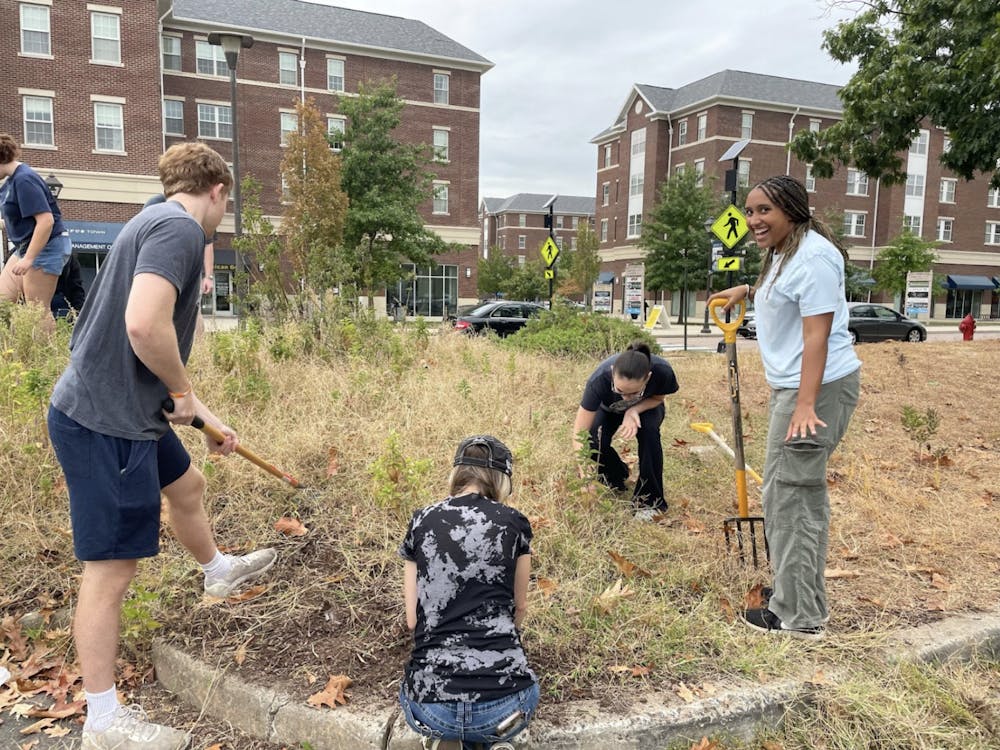Raeanne Raccagno
Staff Writer
When first-year students get dropped off at college for the first time, they may be thinking about what classes they’ll be taking and future friendships. Most students expect to complete another academic milestone, unsure if they will be able to propel solutions for current campus problems.
This was the case for a group of sociology students, until they were presented with environmental concerns on campus and tasked with solving them during the course, Climate Justice and Social Action.
After Miriam Shakow, an anthropology professor, informed her students last spring about current environmental troubles at the College, they teamed up to combat the issues depending on their interests. Three groups were created: composting, native plants and organic land management, the latter of which consisted of eliminating RoundUp and other harmful pesticides used on campus.
The students against RoundUp, who called themselves RoundOut, consisted of about 11 people who started their pilot program in April. The group tested different native plants with different soils in a patch of land behind Decker Hall, past the bridge near Lake Sylva.
RoundUp, a weed killer, has a main ingredient called glyphosate, which the World Health Organization’s International Agency for Research on Cancer classified as “probably carcinogenic to humans” in December 2015.
“I will say like our first time doing the pilot, it was not as successful as it could have been, but that's just because you got to learn the process,” said Jenna Needham, a sophomore sociology major and a Campus As A Living Lab intern. “You can't just go out and do it right away. And your first time is not always going to be a success.”
After planting their seed of environmental justice, the students are now taking their results from the early stages of their pilot program and tweaking the conditions to yield different outcomes.
Karen Kim, a senior sociology major and Campus as a Living Lab intern, said that without a specialist on campus, the interns conduct outside research on their own, because finding and hiring someone has been tough, as Campus as a Living Lab is supported by a grant.
According to Kim, Shakow has been a supportive mentor during the trial, helping the students with various methods to make the plot of land successful. Needham noted that since plants are unpredictable, results are unpredictable and nothing will be perfect.
“There's also the part where you can start fresh by spraying RoundUp and clearing everything out of the way, and that would help us be so much more successful with starting it,” Kim said. “But then it goes against our whole cause of we don't want to be using those chemicals.”
Along with their pilot program, students also came up with three recommendations for the College’s administration:
Start a three-year pilot program and begin facilities education by April 2024, including circulating baseline chemical usage to students and the Environmental Sustainability Council.
Reach 50% organically managed campus land by August of 2028 (One year after the three-year pilot).
Attain platinum certification for the Re: Wild Green Ground by May 2030 (95% of the campus being organically managed)
The students successfully crossed off number one on their list. During the Student Government general body meeting on Oct. 23, Shawn Cappellano-Sarver, associate vice president for facilities management, announced the College will stop using RoundUp on the soil.

A butterfly resting on one of the native plants cultivated on campus by student activists (Photo courtesy of Maria Hourihan).
“But you know, we got to keep going,” Needham said. “Just because it's RoundUp free doesn't mean all the work stops. You can keep going, keep making changes on campus.”
Cappellano-Sarver’s choice to stop the usage of the harmful pesticide came after the interns showed them the results of their study and program.
Despite no longer being in Shakow’s class, the students’ drive to better the campus environment has continued to blossom. RoundOut now handles multiple projects to help better the College’s eco-health and is more commonly associated with Campus as a Living Lab. Now that RoundUp will be gone, their current projects stem from the students’ interests.
Some of the interns’ work includes placing pollinator gardens and native plants on campus, grant proposal writing, event planning, assisting first-year seminars for Campus as a Living Lab courses, outreach and social media.
In addition to working with Campus as a Living Lab, the students bridge together some of the environmental organizations at the College. The students participate in the environmental club and the Environmental Sustainability Council, where they work as the Organic Land Management subgroup.
“I'd say we have a lot going on. It's just a matter of getting more students involved with pushing those projects forward,” Kim said.
With different roots of solutions setting place at the College, the overall mission the interns continue to water is keeping their momentum going. Part of doing so involves getting more students who want to participate in environmental issues. Kim said that some students are hesitant to join due to apprehensions about talking to the administration, but she explained that does not have to be the case and that it can be very simple to help cause a change.
Students can express their interest in getting involved with professors or students in current projects, who can help guide those curious to a better fit for their sustainability appeals. These students know better than anyone that nature stops for no one. While they may not know what will grow tomorrow, doing their small part for the Earth continues to stay second nature.







